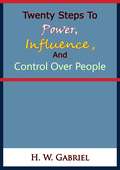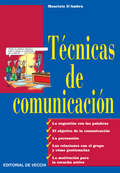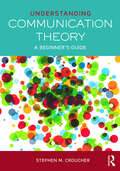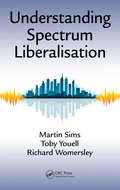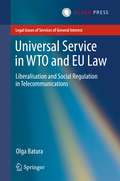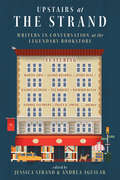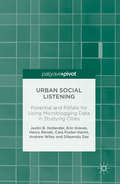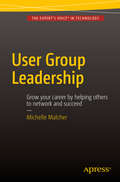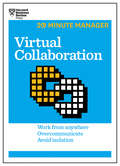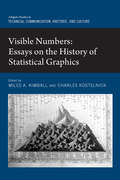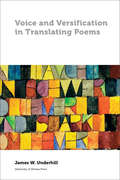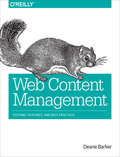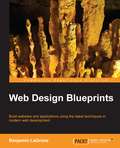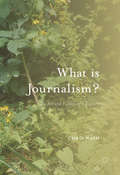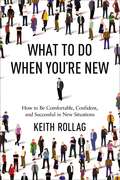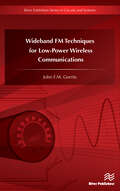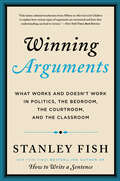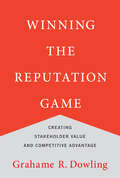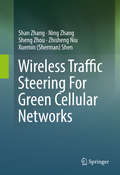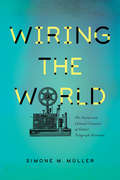- Table View
- List View
Twenty Steps To Power, Influence, And Control Over People
by H. W. GabrielThis Master-Plan gives you the incalculable new power to dominate, command and manipulate people around you!Add new STRENGTH to your WILL!Get new AUTHORITY in your MANNER!New POWER to COMMAND!New-won MASTERY of LIFE!DON'T put off for one more day your decision. Take this book into your life now. Start the automatic success-process working in your own career and personal life as well. You could be--right now--enjoying the glittering rewards life brings to the Man of Power...wealth, good living, a happy family, hosts of admiring friends and subordinates, the prestige and social success given to the Man of Power!USE this step-by-step plan today and watch your life become a golden road to success as you begin to use your new-won POWER...INFLUENCE...and CONTROL OVER THE PEOPLE AROUND YOU!A classic in the Do-It-Yourself genre.
Técnicas de comunicación
by Mauricio D'Ambra- Tanto en las relaciones de trabajo como en las relaciones interpersonales es muy importante comunicar de forma eficaz. - Un buen comunicador es capaz de comprender a su interlocutor, evitar situaciones conflictivas y argumentar de forma convincente y persuasiva. - Con este libro aprenderá cómo utilizar las palabras más adecuadas para convencer, todos los sistemas para persuadir, los mecanismos que orientan el pensamiento. - También podrá aprender cómo evitar las palabras equivocadas o contraproducentes que pueden molestar al interlocutor. - todos los recursos para comuicar Con el grupo aprovechando las técnicas para captar la atención del auditorio.
Understanding Communication Theory: A Beginner's Guide
by Stephen M. CroucherThis book offers students a comprehensive, theoretical, and practical guide to communication theory. Croucher defines the various perspectives on communication theory—the social scientific, interpretive, and critical approaches—and then takes on the theories themselves, with topics including interpersonal communication, organizational communication, intercultural communication, persuasion, critical and rhetorical theory and other key concepts. Each theory chapter includes a sample undergraduate-written paper that applies the described theory, along with edits and commentary by Croucher, giving students an insider’s glimpse of the way communication theory can be written about and applied in the classroom and in real life. Featuring exercises, case studies and keywords that illustrate and fully explain the various communication theories, Understanding Communication Theory gives students all the tools they need to understand and apply prominent communication theories.
Understanding English Grammar: Tenth Edition
by Loretta Gray Robert W. Funk Joseph Salvatore Martha J. KollnThe essentials of English grammar, with a distinctively clear organization and user-friendly language. The acclaimed Understanding English Grammar fosters students’ innate language expertise as they study sentence grammar. It offers a practical blend of the most useful elements of both traditional and new linguistic grammar, beginning with an overview of English as a world language, language change, and various classroom issues associated with prescriptive grammar and correctness, along with an updated list of further readings. Every discussion is viewed through the eyes of a novice reader, bearing in mind how the current generation of students uses communication tools for social purposes. Both students and teachers appreciate the self-teaching quality that incremental exercises provide throughout the chapters, with answers at the end of the book. The Tenth Edition introduces new coauthors Loretta Gray and Joseph Salvatore—two respected scholars who bring their special expertise in linguistics and creative writing, as well as long experience in teaching grammar and writing.
Understanding Spectrum Liberalisation
by Martin Sims Toby Youell Richard WomersleyUntil the 1990s, almost all spectrum licenses were given away practically for free-even the first mobile licenses which laid the foundation for multi-billion dollar companies that dominate stock markets around the world. In the past fifteen years, there has been a concerted attempt to liberalise the sector and make it more open to market forces. Th
Universal Service in WTO and EU law
by Olga BaturaThis book is a systematic comparative study of WTO and EU law relevant for universal service provision, and a timely contribution to the ongoing scholarly and policy debates about the concept and scope of universal service. Universal service is one of the most significant regulatory issues worldwide and it is likely to remain so. The central question dealt with by the author is how the technologically intensive sector of telecommunications services can be regulated in a socially fair way in the light of liberalisation and the immense importance of ICTs in the Information Society. The author investigates whether the legal frameworks of WTO and EU can meet the challenges of the rapid and dramatic technological and social change and formulates relevant policy recommendations. The book is of interest to both scholars and practitioners in several disciplines, such as EU and WTO law, telecommunications law and regulation, political science regarding market regulation and governance as well as European integration and WTO. Olga Batura is affiliated to the Leuphana Law School, University of Lüneburg, Germany, and to the European Humanities University in Vilnius, Lithania.
Upstairs at the Strand: Writers in Conversation at the Legendary Bookstore
by Jessica Strand Andrea AguilarRevelatory conversations between renowned writers at New York City's legendary bookstore. For nearly ninety years, the Strand Book Store has been a New York institution, a legendary mecca for readers throughout the five boroughs, across the country, and around the world. Featuring freewheeling and behind-the-scenes conversations between renowned novelists, playwrights, and poets on how they work, think, and live, Upstairs at the Strand captures the happy collision of books and ideas in the Strand's famed reading series in its Rare Book Room. Upstairs at the Strand is indispensable for aspiring writers, readers of contemporary literature, and devoted fans of the 18 Miles of Books at the Strand Book Store. Contributors include: Renata Adler * Edward Albee * Hilton Als * Paul Auster * Blake Bailey * Alison Bechdel * Tina Chang * Junot Díaz * Deborah Eisenberg * Rivka Galchen * A. M. Holmes * Hari Kunzru * Rachel Kushner * Wendy Lesser * D. T. Max * Leigh Newman * Téa Obreht * Robert Pinsky * Katie Roiphe * George Saunders * David Shields * Charles Simic * Tracy K. Smith * Mark Strand * and Charles Wright.
Urban Social Listening
by Justin B. Hollander Erin Graves Henry Renkski Cara Foster-Karim Andrew Wiley Dibyendu DasThis book analyses new software tools and social media data that can be used to explore the attitudes of people in urban places. It reports on the findings of several research projects that have have experimented with using microblogging data in conjunction with diverse quantitative and qualitative methods, including content analysis and advanced multivariate statistics. Applied researchers, planners and policy makers have only recently begun to explore the potential of Big Data to help understand social attitudes and to potentially inform local policy and development decisions. This book provides an original analysis into how Twitter can be used to describe the urban experience and people's perception of place, as well as offering significant implications for public policy. It will be of great interest to researchers in human geography, social media, cultural studies and public policy.
User Group Leadership
by Michelle MalcherThis book is about starting and sustaining a technology user group. User groups are a wonderful way to connect with local and like-minded professionals for networking and learning. All the forums and social media on the internet can't replace face-to-face time spent discussing problems, upcoming technologies, and other pertinent topics. What every user group needs is leaders to organize meetings, find speakers, and connect the community. What every leader needs is good advice and guidance on how to begin a group and nurture new leadership to keep the group sustainable, and Michelle Malcher provides just that right sort of guidance in her book on User Group Leadership. This book is designed to help you understand what goes into starting and building a user group, giving you the tools and resources to do so. Learn what to expect before your first meeting, in the first three months, and in the first year. Malcher has experience from the local group level on up to the international level with the Independent Oracle User Group. If you're involved in technology and are ready to take on a position of leadership by which to help others network, succeed, and grow, then grab a copy of this book. You won't find a better source of guidance for starting and growing a new group on the technology of your choice. Learn what to know before you ever have your first meeting Prepare for each meeting with a list of things that should be done Grow your local members into future leaders What you'll learn Choose the right motivations for starting a group Build a governance structure and integrate with an umbrella group Locate and book interesting speakers Recruit help to share the administrative burden Grow the next generation of leadership Make a difference in people's careers by helping them grow and network and learn Who this book is for User Group Leadership is aimed at technology professionals interested in networking and learning with like-minded people in their same technology area. The book is especially aimed at the ambitious professional who is ready to step into a leadership role by creating a vibrant user community where no such community currently exists, but one is needed. Table of Contents 1. Development of a User Group 2. User Group Governance 3. Building Leaders and Volunteers 4. User Group Planning 5. User Group Members 6. Challenges 7. Career Development 8. From Techie to Leader 9. Qualities of a User Group Leader 10. Qualities of a User Group Volunteer
Virtual Collaboration (HBR 20-Minute Manager Series)
by Harvard Business ReviewWorking remotely gives you flexibility and independence. But it can pose challenges when you need to team up with colleagues or coworkers. Virtual Collaboration covers the basics of working productively-and collaboratively-from anywhere. You'll learn to: Communicate clearly over a variety of media Bond with colleagues across the wires Keep others-and yourself-accountable Avoid and mitigate tech glitchesDon't have much time? Get up to speed fast on the most essential business skills with HBR's 20-Minute Manager series. Whether you need a crash course or a brief refresher, each book in the series is a concise, practical primer that will help you brush up on a key management topic. Advice you can quickly read and apply, for ambitious professionals and aspiring executives-from the most trusted source in business. Also available as an ebook.
Visible Numbers: Essays on the History of Statistical Graphics
by Charles KostelnickBringing together scholars from around the world, this collection examines many of the historical developments in making data visible through charts, graphs, thematic maps, and now interactive displays. Today, we are used to seeing data portrayed in a dizzying array of graphic forms. Virtually any quantified knowledge, from social and physical science to engineering and medicine, as well as business, government, or personal activity, has been visualized. Yet the methods of making data visible are relatively new innovations, most stemming from eighteenth- and nineteenth-century innovations that arose as a logical response to a growing desire to quantify everything-from science, economics, and industry to population, health, and crime. Innovators such as Playfair, Alexander von Humboldt, Heinrich Berghaus, John Snow, Florence Nightingale, Francis Galton, and Charles Minard began to develop graphical methods to make data and their relations more visible. In the twentieth century, data design became both increasingly specialized within new and existing disciplines-science, engineering, social science, and medicine-and at the same time became further democratized, with new forms that make statistical, business, and government data more accessible to the public. At the close of the twentieth century and the beginning of the twenty-first, an explosion in interactive digital data design has exponentially increased our access to data. The contributors analyze this fascinating history through a variety of critical approaches, including visual rhetoric, visual culture, genre theory, and fully contextualized historical scholarship.
Voice and Versification in Translating Poems (Perspectives on Translation)
by James W. UnderhillGreat poets like Shelley and Goethe have made the claim that translating poems is impossible. And yet, poems are translated; not only that, but the metrical systems of English, French, Italian, German, Russian and Czech have been shaped by the translation of poems. Our poetic traditions are inspired by translations of Homer, Dante, Goethe and Baudelaire. How can we explain this paradox? James W. Underhill responds by offering an informed account of meter, rhythm, rhyme, and versification. But more than that, the author stresses that what is important in the poem—and what must be preserved in the translated poem—is the voice that emerges in the versification. Underhill’s book draws on the author’s translation experience from French, Czech and German. His comparative analysis of the versifications of French and English have enabled him to revise the key terms involved in translating the poetic voice and transposing the poem’s versification. The theories of versification from the Prague School of Linguistics, the French and Swiss schools of versification, and recent scholarship in metrics and rhythm in the UK and in the USA have been integrated into this synthetic but rigorously coherent approach to translating poems. The extensive glossary at the end of the book will prove useful for both students and teachers alike. And the detailed case studies on translating poems by Baudelaire and Emily Dickinson allow the author to categorize and appraise the various poetic and aesthetic strategies and theories that are brought to bear in translating Baudelaire into English, and Dickinson into French.
Wasting Time on the Internet
by Kenneth GoldsmithUsing clear, readable prose, conceptual artist and poet Kenneth Goldsmith’s manifesto shows how our time on the internet is not really wasted but is quite productive and creative as he puts the experience in its proper theoretical and philosophical context.Kenneth Goldsmith wants you to rethink the internet. Many people feel guilty after spending hours watching cat videos or clicking link after link after link. But Goldsmith sees that “wasted” time differently. Unlike old media, the internet demands active engagement—and it’s actually making us more social, more creative, even more productive.When Goldsmith, a renowned conceptual artist and poet, introduced a class at the University of Pennsylvania called “Wasting Time on the Internet”, he nearly broke the internet. The New Yorker, the Atlantic, the Washington Post, Slate, Vice, Time, CNN, the Telegraph, and many more, ran articles expressing their shock, dismay, and, ultimately, their curiosity. Goldsmith’s ideas struck a nerve, because they are brilliantly subversive—and endlessly shareable.In Wasting Time on the Internet, Goldsmith expands upon his provocative insights, contending that our digital lives are remaking human experience. When we’re “wasting time,” we’re actually creating a culture of collaboration. We’re reading and writing more—and quite differently. And we’re turning concepts of authority and authenticity upside-down. The internet puts us in a state between deep focus and subconscious flow, a state that Goldsmith argues is ideal for creativity. Where that creativity takes us will be one of the stories of the twenty-first century.Wide-ranging, counterintuitive, engrossing, unpredictable—like the internet itself—Wasting Time on the Internet is the manifesto you didn’t know you needed.
Web Content Management: Systems, Features, and Best Practices
by Deane BarkerLooking to select a web content management system (CMS), but confused about the promises, terminology, and buzzwords? Do you want to understand content management without having to dive into the underlying programming? This book provides a clear, unbiased overview of the entire CMS ecosystem--from platforms to implementations--in a language- and platform-agnostic manner for project managers, executives, and new developers alike.Author Deane Barker, a CMS consultant with almost two decades of experience, helps you explore many different systems, technologies, and platforms. By the end of the book, you'll have the knowledge necessary to make decisions about features, architectures, and implementation methods to ensure that your project solves the right problems.Learn what content is, how to compare different systems, and what the roles of a CMS team areUnderstand how a modern CMS models and aggregates content, coordinates workflow, and manages assetsExplore the scope and structure of a CMS implementation projectLearn the process and best practices for successfully running your CMS implementationExamine the practice of migrating web content, and learn how to work with an external CMS integrator
Web Design Blueprints
by Benjamin LagroneBuild websites and applications using the latest techniques in modern web development About This Book * Create amazing modern day applications that run seamlessly across multiple platforms * Implement multiple methodologies by creating different apps with dynamic features * This unique project-based guide will help you build your own websites efficiently Who This Book Is For This book is a must-have for web developers who want to stay on top of the latest trends in web app and site development. If you are a web developer who is already familiar with HTML, CSS, and functional JavaScript, and you want to learn the latest trends in web development, this is the book for you. What You Will Learn * Find out how to create responsive websites * Create websites using the principals of Flat design * Create deep-dive sites using parallax scrolling * Discover how to use Ajax in single-page applications * Create responsive navigation with CSS and JavaScript * Create responsive padding with the box model property In Detail The book delivers simple instructions on how to design and build modern Web using the latest trends in web development. You will learn how to design responsive websites, created with modern Flat User Interface design patterns, build deep-scrolling websites with parallax 3D effects, and roll-your-own single-page applications. Finally, you'll work through an awesome chapter that combines them all. Each chapter features actual lines of code that you can apply right away. Style and Approach Using real-world examples, Web Design Blueprints presents practical how-to projects for site enhancements, with a light-hearted, easy-to-understand tone. This book has individual projects that cumulate until you finally build a super-project at the end, using all the skills learned
What is Journalism?
by Chris NashThis book argues that journalism should treat itself as an academic discipline on a par with history, geography and sociology, and as an art form in its own right. Time, space, social relations and imagination are intrinsic to journalism. Chris Nash takes the major flaws attributed to journalism by its critics--a crude empiricism driven by an un-reflexive 'news sense'; a narrow focus on a de-contextualised, transient present; and a too intimate familiarity with powerful sources--and treats them as methodological challenges. Drawing on the conceptual frameworks of Pierre Bourdieu, David Harvey, Henri Lefebvre, Michel-Rolph Trouillot and Gaye Tuchman, he explores the ways in which rigorous journalism practice can be theorised to meet these challenges. The argument proceeds through detailed case studies of work by two leading iconoclasts--the artist Hans Haacke and the 20th century journalist I. F. Stone. This deeply provocative and original study concludes that the academic understanding of journalism is fifty years behind its practice, and that it is long past time for scholars and practitioners to think about journalism as a disciplinary research practice. Drawing on an award-winning professional career and over three decades teaching journalism practice and theory, Chris Nash makes these ideas accessible to a broad readership among scholars, graduate students and thoughtful journalists looking for ways to expand the intellectual range of their work.
What to Do When You're New: How to Be Comfortable, Confident, and Successful in New Situations
by Keith RollagBlending stories and insights with simple techniques and exercises, this invaluable guide for the introvert will get you out of your comfort zone and trying new things in no time.Whether you&’re changing jobs, joining a group, or moving to a new city, putting yourself out there in new situations is no picnic. Being forced to introduce yourself, having to ask questions among strangers, learning expectations of those around you--it&’s not fun for anyone! However, when we let our worries stop us from getting familiar with our surroundings and learning the dos and don&’ts of our new environment, we seriously hinder our progress, joy, and the opportunities that await us.In What to Do When You're New, you can discover the necessary skills to learn how to:Overcome fearsMake great first impressionsTalk to strangers with easeGet up to speed quicklyConnect with people wherever you goThis book combines the author's research and firsthand experience from having to adjust to a job transfer to Japan with that of leading scientists to explain why we are so uneasy in new situations--and how we can learn to become more confident and successful newcomers.
Why Leadership Training Fails--and What to Do About It
by Michael Beer Magnus Finnstrom Derek Schrader"The Problem Companies are dumping billions of dollars into training and development programs—but their investments aren’t paying off. The Reason Six common managerial and organizational barriers prevent people from applying what they’ve learned, no matter how smart and motivated they are. The Solution To create a favorable context for learning and growth, senior executives must first attend to organizational design—both at the very top and unit by unit."
Wideband FM Techniques for Low-Power Wireless Communications
by John F.M. GerritsUltra Wideband (UWB) communications are poised to enable short-range applications, such as remote health monitoring (e-health) and home or office automation. Sensor networks are also suitable candidates for UWB since the low radiated power of the UWB transmitter enables low DC power consumption, yielding long battery life and the possibility to use energy scavenging. Size and cost constraints require a low-complexity approach that allows multiple users to share the same RF bandwidth, and offers robustness to interference, frequency-selective multipath and antenna mismatch. Wideband FM Techniques for Low-Power Wireless Communications presents research and applications that have taken place in UWB Communications over the past years. This book is being published posthumously in agreement with the authors’ former colleagues from both the Swiss Center for Electronics and Microtechnology (CSEM) and Delft University of Technology in The Netherlands.
Will Self and Contemporary British Society
by G. MatthewsThis stimulating and comprehensive study of Will Self's work spans his entire career and offers insightful readings of all his fictional and non-fictional work up to and including his Booker prize nominated novel Umbrella.
Winning Arguments: What Works and Doesn't Work in Politics, the Bedroom, the Courtroom, and the Classroom
by Stanley FishA lively and accessible guide to understanding rhetoric by the world class English and Law professor and bestselling author of How to Write a Sentence.Ever wonder how gay marriage became accepted over such a short period, after thousands of years of peril? Or how you were dumb enough to get in that last quarrel with your significant other? Or how Donald Trump became the clear front-runner in the Republican presidential primary? Or how millions continue to deny the devastating effects of global warming? In Winning Arguments, professor and New York Times–bestselling author Stanley Fish touches on these hot-button issues as he reveals how successful argument can be used to win over popular opinion.With wit and wisdom, Fish delves into a wide range of subjects, including Donald Trump, the Supreme Court, the logic of toddlers, Monty Python, the National Football League, Holocaust denial and creationism, the nature of political spin, and the fall of Adam and Eve.For students, teachers, lawyers, managers, husbands, wives—indeed, anyone looking to persuade their opponent—Winning Arguments is a fun read and powerful tool that will stay with readers long after they finish the book. For, as Fish writes, “argument is unavoidable, argument is interminable, argument is all we have.”
Winning the Reputation Game: Creating Stakeholder Value and Competitive Advantage
by Grahame R. DowlingCore strategies for creating a corporate reputation that will provide a competitive advantage in the marketplace: a back-to-basics approach. What does a company have to do to be admired and respected? Why does Apple have a better reputation than, say, Samsung? In Winning the Reputation Game, Grahame Dowling explains. Companies' reputations do not derive from consultant-recommended campaigns to showcase efforts at corporate transparency, environmental sustainability, or social responsibility. Companies are admired and respected because they are “simply better” than their competitors. Companies that focus on providing outstanding goods and services are rewarded with a strong reputation that helps them gain competitive advantage. Dowling, who has studied corporate reputation–building for thirty years, describes two core strategies for creating a corporate reputation that will provide a competitive advantage: to be known for being Best at Something or for being Best for Somebody. Apple, for example, is best at personal technology products that enhance people's lifestyles. IKEA is best for people who want well-designed furniture at affordable prices. Dowling covers such topics as the commercial value of a strong reputations—including good employees, repeat customers, and strong share price; how corporate reputations are formed; the power of “being simply better”; the effectiveness of corporate storytelling (for good or ill; Kenneth Lay of Enron was a master storyteller); and keeping out of trouble. Drawing on many real-world examples, Dowling shows how companies that are perceived to be better than their competitors build strong reputations that reflect past success and promise more of the same. Companies that artificially engineer a reputation with irrelevant activities but have stopped providing the best products and services available often wind up with mediocre—or worse—reputations.
Wireless Network Performance Enhancement via Directional Antennas: Models, Protocols, and Systems
by Sunil Kumar Fei Hu John D. MatyjasDirectional antenna technologies have made significant advancements in the last decade. These advances have opened the door to many exciting new design opportunities for wireless networks to enhance quality of service (QoS), performance, and network capacity. In this book, experts from around the world present the latest research and development in
Wireless Traffic Steering For Green Cellular Networks
by Ning Zhang Xuemin Sherman Shen Sheng Zhou Zhisheng Niu Shan ZhangThis book introduces wireless traffic steering as a paradigm to realize green communication in multi-tier heterogeneous cellular networks. By matching network resources and dynamic mobile traffic demand, traffic steering helps to reduce on-grid power consumption with on-demand services provided. This book reviews existing solutions from the perspectives of energy consumption reduction and renewable energy harvesting. Specifically, it explains how traffic steering can improve energy efficiency through intelligent traffic-resource matching. Several promising traffic steering approaches for dynamic network planning and renewable energy demand-supply balancing are discussed. This book presents an energy-aware traffic steering method for networks with energy harvesting, which optimizes the traffic allocated to each cell based on the renewable energy status. Renewable energy demand-supply balancing is a key factor in energy dynamics, aimed at enhancing renewable energy sustainability to reduce on-grid energy consumption. Dynamic network planning adjusts cell density with traffic variations to provide on-demand service, which reduces network power consumption with quality of service provisioning during off-peak hours. With intra- or inter-tier traffic steering, cell density is dynamically optimized with regards to the instant traffic load for conventional homogeneous and multi-tier heterogeneous cellular networks, respectively. This book is beneficial for researchers and graduate students interested in traffic management and future wireless networking.
Wiring the World: The Social and Cultural Creation of Global Telegraph Networks (Columbia Studies in International and Global History)
by Simone MüllerThe successful laying of a transatlantic cable in 1866 remade world communications. A message could travel across the ocean in minutes, shrinking the space between continents, cultures, and nations. An eclectic group of engineers, entrepreneurs, politicians, and media visionaries then developed this technology into a telecommunications system that spread a particular vision of civilization—but not everyone wanted to wire the world the same way. Wiring the World is a cultural and social history that explores how the large Anglo-American cable companies won out over alternative visions. Bitter rivalries emerged over telegram prices, visions for world peace, scientific innovation, and the role of the nation-state. Such struggles determined the growth of cable technology, which in turn influenced world history. Filled with fascinating characters and new insights into pivotal events, Wiring the World traces globalization's diverse paths and close ties to business and politics.
